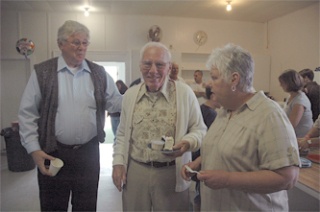ARLINGTON HEIGHTS — “It was 66 days of hell,” said 89-year-old Arlington resident Ed Chrisman, who’s deeply grateful to be back on American soil. “I can still hardly believe it. I didn’t think I’d ever get out.”
On May 3, Chrisman’s friends and family members celebrated his return from Mexico, where he and his grandson were imprisoned, but the celebration was bittersweet since Gary Lee Chrisman, Ed Chrisman’s grandson, is still imprisoned in Mexico and facing a May 8 trial date.
On Jan. 8, Ed and Gary Chrisman took a trip to Algodones, Mexico. Gary works just across the border in Yuma, Ariz., and Ed had traveled to Yuma for his annual winter stay. Gary had made a dental appointment in Algodones and invited Ed along. In retrospect, Ed regrets that they went across the border, that they left the main streets and that they stopped at a convenience store for a drink.
“Before we even knew what was happening, we were surrounded by five police cars,” Ed Chrisman said. “We were never told what we were accused of doing, but we were able to piece it together eventually.”
When the Chrisman family in America hired a Mexican attorney, they learned that a mother in the convenience store had accused both men of asking her 13-year-old daughter if they could take a sexually explicit photograph of her. According to Gary Chrisman, the photographs he took were not sexually explicit and the mother had given her permission, but she had asked for more than the $25 he had given her. Both Gary and Ed Chrisman agreed that Ed never entered the convenience store.
None of this was explained to the Chrismans as they were searched and stripped of their wallets, their watches and even their shoelaces at a local jail. Officers also took Gary’s camera, which contained photos of the streets of Algodones, including an outdoor cantina, as well as the staff at the dental office Gary had visited. For the next three days, Gary and Ed Chrisman were held without food, water, blankets or heat in isolated cells so cold that they had to walk all night just to stay warm. They were also denied phone calls, which meant that the Chrisman family in America had to investigate on its own to find out what had happened to Gary and Ed.
Although Ed Chrisman deemed the conditions “a little better” at the Mexicali federal prison in Baja California Norte, they were still dire enough that he contracted pneumonia. The Chrismans were given no idea about when they might be released, as Ed slept on a metal bed frame and Gary slept on a wet concrete floor. Ed Chrisman’s deteriorating health eventually resulted in his move to a ward for elderly prisoners, but he still had to eat the same prison food that had helped make him ill and, as with all prisoners in Mexico, his family was expected to provide him with basic necessities such as toiletries and even clothing.
“For a while, I was the only white boy with a bunch of Mexicans,” said Ed Chrisman, who nonetheless appreciated the kind treatment and bilingual ability of many of his fellow prisoners. “We had no mail privileges and family members could only visit on Saturdays, and even then only if they got passes.”
For Ed’s children, Don Chrisman and Marie Saxton, their father’s time in prison made them feel like they were doing time as well, as they struggled with feelings of uncertainty and helplessness. Don cited the laundry list of legal documents that the Mexican government required, including not only a birth certificate with an official state seal, but also a document from the state to certify that the birth certificate itself was authentic.
“If the staple was removed between those two documents, they were both rendered null and void,” Don Chrisman said. “I volunteered to go to Arizona, to try and help, but our lawyer told us not to, because he warned that the more faces they saw at the prison, the more money they would see. I felt guilty every time I had a warm shower or a warm meal, or slept in my bed.”
On Feb. 9, a Mexican federal judge ruled that Ed Chrisman’s rights had been violated and that he should be set free and not required to stand trial, but he remained in prison until March 14 when the paperwork reached Mexicali. Gary Chrisman is still scheduled to stand trial on May 8.







